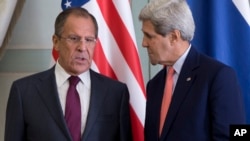U.S. Secretary of State John Kerry and Russian Foreign Minister Sergei Lavrov on Tuesday agreed to share intelligence information about Islamic State militants during talks in Paris that also touched on Ukraine and Iran’s nuclear program.
Addressing reporters after more than three hours of talks, Kerry said he and Lavrov agreed to “intensify intelligence cooperation” on Islamic State fighters. As many as 500 Russians are thought to be part of that group, which also is known as ISIL.
Kerry said Lavrov also agreed to increase arms and training for Iraqi forces that are fighting the group.
“We both recognize that ISIL has absolutely no place in the 21st century," Kerry said. "No decent country by any definition can support the horrors that are perpetrated by ISIL. And no civilized country should shirk its responsibility to stand up and be part of the effort to stamp out this disease.”
According to The Associated Press, Lavrov, addressing a separate press conference, verified the intelligence-sharing arrangement and "also spoke positively about improving U.S.-Russian ties."
"Mr. Kerry and I don't represent warring sides," he told reporters, adding that both nations have a "special" global role that entails mutual cooperation "to increase the effectiveness of settling problems for larger society," including the battle against global terrorism.
Russia has criticized coalition airstrikes against the Islamic State across the border in Syria because those attacks are being undertaken without the consent of the government in Damascus.
U.S. officials on Sunday said Turkey has approved the use of its Incirlik air base to attack Islamic State targets. But Turkish officials Monday denied such an agreement. Asked about those mixed messages, Kerry said there is “no discrepancy” between the United States and Turkey with regard to combating Islamic State militants that are fighting for control of a Kurdish town in Syria near the Turkish border.
Ukraine
Kerry and Lavrov also discussed the battle for eastern provinces of Ukraine, where Moscow is backing ethnic Russian separatists against the government in Kyiv.
Calling for the withdrawal of all "foreign forces" from eastern Ukraine, the top U.S. diplomat said the international community will not recognize any separatist referendums in eastern Ukraine, and that Washington and Moscow are working to manage their differences over the issue.
Kerry also called for a halt to fighting between Ukrainian government forces and Russia-backed separatists around eastern Ukraine's Donetsk airport.
“The shooting around Donetsk airport and other parts of Eastern Ukraine has to stop," he said. "Foreign forces and weapons need to be withdrawn. Hostages, all hostages need to be released.”
While Russian troops are withdrawing from Ukraine — a key condition for lifting sanctions against Russia — Kerry said heavy weaponry has not yet been removed.
On Sunday, Russian President Vladimir Putin ordered more than 17,000 troops to withdraw from an area near the Ukrainian border as he prepares to meet with Ukrainian President Petro Poroshenko on the sidelines of an Asia-Europe summit later this week in Milan.
Russia has consistently denied the presence of its troops inside Ukraine, while separatist rebel leaders say they have been helped by Russian soldiers.
Despite a cease-fire agreement signed last month, fighting between the Ukrainian government and Russia-backed separatist forces has continued. Officials in the southern port city of Mariupol reported Tuesday that seven civilians were killed and at least 15 were wounded when rebels fired rockets at Ukrainian military checkpoints and also hit the village of Sartana on the city's outskirts. The victims apparently were killed when a rocket hit a funeral procession in the village.
President Putin charged Tuesday that Ukrainian government forces in eastern Ukraine breached the 1948 Genocide Convention by subjecting people there to "torture, brutal and degrading punishment, discrimination and extrajudicial decisions.
Speaking to a meeting in Moscow of the Presidential Council for Human Rights, Putin also accused unspecified international human rights groups of "turning a blind eye" to the violations in eastern Ukraine.
Earlier Tuesday, Ukraine's parliament approved a new defense minister, the fourth change in leadership since Russia's annexation of Crimea in March.
The head of Ukraine's National Guard, Stepan Poltorak, will take over for Valeriy Heletey, who resigned amid heavy criticism for the crushing defeat of Ukrainian forces east of Donetsk in late August.
Iran
Kerry and Lavrov also discussed international efforts to limit Iran’s nuclear program ahead of a new round of negotiations in Vienna. In a televised address late Monday, Iranian President Hassan Rouhani said a settlement “can be achieved” by next month’s deadline.
Secretary Kerry travels to Vienna Wednesday for talks with Iranian Foreign Minister Javad Zarif and European Union representative Cathy Ashton, and held out hope that these negotiations may succeed.
“I don’t believe it’s out of reach. But we have some tough issues to resolve," Kerry said, adding that he's "not going to prognosticate.”
Lavrov said Russia, the United States, Britain, France, China, and Germany are doing everything they can to reach an agreement with Iran as soon as possible.
Questions surrounding these kinds of agreements are not so difficult at first glance, Lavrov told reporters, but as you get closer to a decision, everyone wants a little bit more.
Lavrov also said he’s sure a compromise is possible but cannot guarantee it will be done by the November 24 deadline.
While in Paris, Kerry and Lavrov met separately with French Foreign Minister Laurent Fabius for talks that included instability in Libya and efforts to stop the spread of Ebola.
Some information for this report comes from AP, AFP and Reuters.




